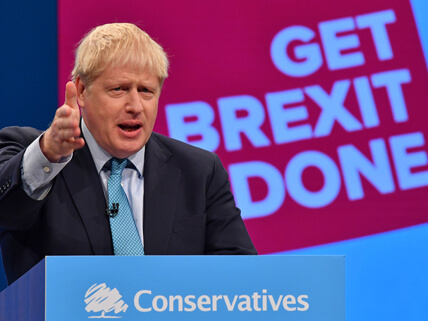British Prime Minister Boris Johnson campaigning for Brexit, October 2019
Brexit—Britain’s exit from the European Union (EU)—will finally kick off on January 31. The outcome of the United Kingdom (UK) splitting from the EU remains uncertain, but the seemingly endless pregame show is over. On December 12, the UK held a parliamentary general election. The Conservative, or Tory, Party, led by Prime Minister Boris Johnson, won a decisive victory, gaining an 80-seat majority in Parliament. The vote was essentially a “second referendum” on Brexit. In the first referendum, which took place in June 2016, the British people voted by a small but clear margin for the UK to leave the EU. The original date set for the UK’s departure was March 2017.
That deadline and then others came and went as Brexit was delayed due to drawn-out negotiations with the EU over the terms by which the UK would separate—and wrangling especially within Parliament itself. Some Britons favored leaving without any deal whatsoever. For more than three and a half years, Britain’s political class proved unable or unwilling to follow through on the vote of the people taken in mid-2016. The resulting voter dissatisfaction set the stage for Johnson’s successful “Get Brexit Done” campaign.
In victory, Prime Minister Boris Johnson declared that the result “gives us . . . the chance to respect the democratic will of the British people.” As a result of Britain’s third general election in less than five years, Johnson will have a solid majority for a five-year term. However, the former mayor of London, a stalwart Brexiteer from the beginning, promised voters he would pursue a centrist agenda. Although the Tories routed the British Labour Party, Tory leaders realize they were helped by many voters who don’t ordinarily vote for Conservatives or their policies.
The Brexit process should keep Johnson and co. busy. After January 31, the UK will no longer have any voting rights in the EU. It will remain tethered as part of the EU single market and customs union through the end of 2020. UK-EU negotiations on trade will continue during this transition period. Other issues to be resolved with the EU include aviation standards, electricity supplies, medicine regulations, and security and data sharing. A trade deal between the United States and Britain will likely follow. Nothing much will change immediately for British businesses and citizens—beyond a sense of relief that the country can now move on.
Image credit: © Ben Stansall/AFP via Getty Images
Related Links:
- What the UK Election Result Means for Brexit
Summary of the outcome of the December 12 British parliamentary election.
(Source: CNBC.com, December 13, 2019) - Brexit, Actually
Boris Johnson (as Andrew Lincoln) in the brilliant political parody of “Love, Actually” that may have put the Tories over the top.
(Source: UK Conservative Party, December 9, 2019) - UK Is Set to Exit the EU Next Month: Here Are Some Important Brexit-Related Dates of 2020
What’s next for Brexit—an outline of the process; includes “Why Is Brexit So Complicated?” video.
(Source: CNBC.com, December 19, 2019) - British Politics in 2019: The Year Brexit Was Won
A look back on British politics in 2019 that culminated in the vote to “Get Brexit Done.”
(Source: Fox News, December 30, 2019) - Brexit Timetable: What Happens Next? MPs FINALLY Approve WAB
British tabloid counts down to Brexit, tracking the progress of the Withdrawal Agreement Bill through Parliament.
(Source: Express.co.uk, January 13, 2020)




